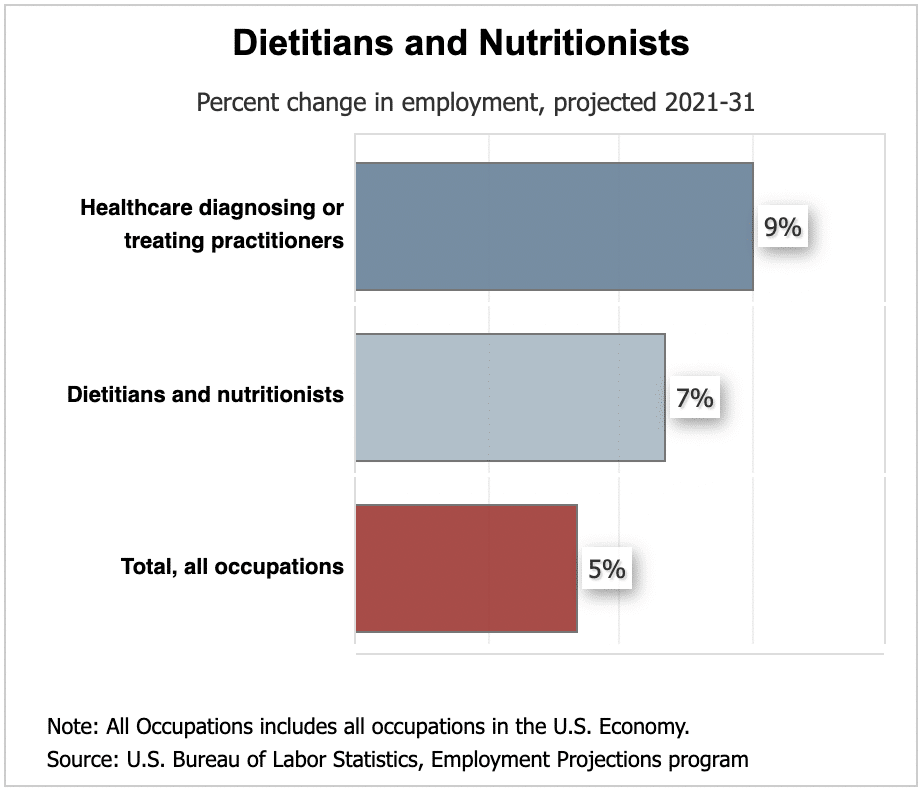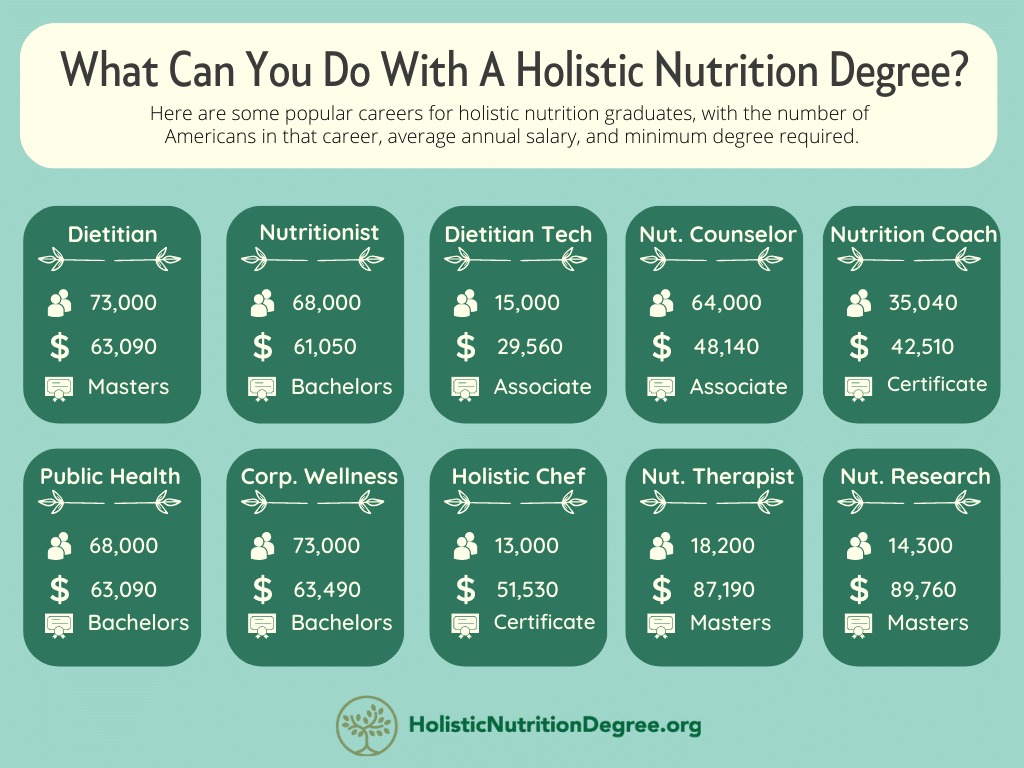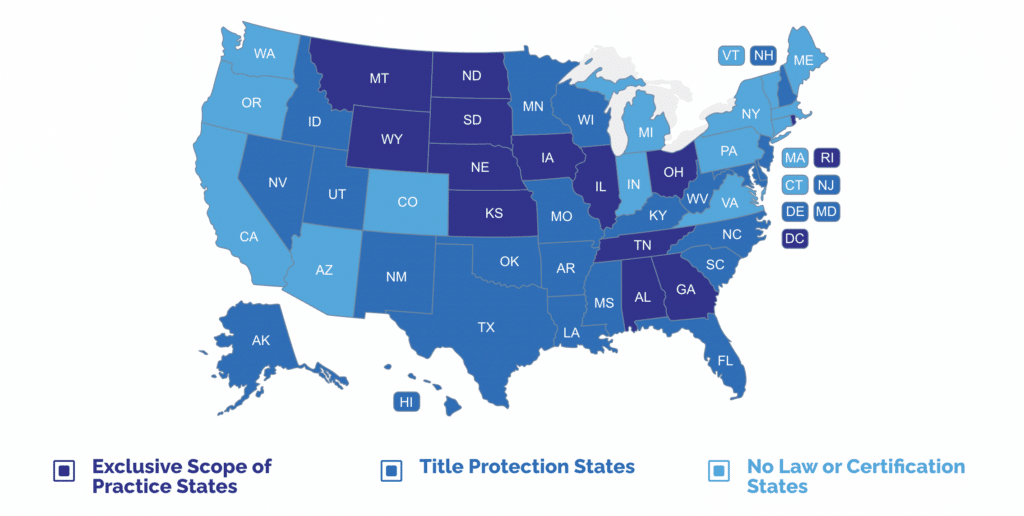
Holistic Nutrition Careers
More Answers From Holistic Nutritionists and Dietitians
Did You Know?
Holistic nutrition jobs are expected to grow 7% by 2031, faster than the national average.
Career Overview
What Can You Do With A Holistic Nutrition Degree?
A holistic nutrition certificate or degree prepares you for a wide range of careers. Here is a list of some of the more common
- Clinical Nutritionist – Clinical nutritionists work in hospitals, medical clinics, and private practice offices, helping individuals achieve healthy physiological function by assessing their nutritional needs through biochemical laboratory testing.
- Dietitians – Holistic dietitians are nutrition experts who help people understand the science behind food and nutrition enabling them to make smarter and healthier food choices. Dietitians typically work in hospitals, medical clinics, schools, nursing homes, private practice offices, athletic clubs, and wellness centers.
- Nutritional Counselor – Nutritional counselors work in hospitals, medical clinics, schools, nursing homes, food product companies, and in public health agencies. They are concerned with human nutrition and how it can prevent or lead to various diseases or illnesses.
- Public Health Holistic Nutritionist – A public health holistic nutritionist is a registered dietitian who creates partnerships in the community to assure adequate and appropriate food and nutrition resources for the whole population, all ages and facilitates nutrition system and policy changes in the community. Typically a public health nutritionist works in local organizations, welfare agencies, schools, community nutrition centers, international organizations or agencies.
- Nutrition Educator – Health educators teach others about behaviors that promote wellness, evaluate the effectiveness of health programs and materials, and advocate for improved health and wellness resources. They most commonly work in schools, hospitals, non-profit organizations, government, doctors’ offices, and in private businesses.
- Holistic Nutrition Consultant – As a holistic nutrition consultant, you will work one-on-one with clients to develop personalized nutrition plans that address their specific needs and health concerns. This can involve analyzing their diet, lifestyle, and medical history to develop a plan that focuses on holistic health and wellness.
- Holistic Health Coach – Health coaches work with clients to help them make positive lifestyle changes that improve their overall health and well-being. As a holistic nutrition graduate, you will have the knowledge and skills to help clients create healthy habits around food, exercise, and self-care.
- Corporate Wellness Consultant – As a corporate wellness consultant, you will work with companies to develop wellness programs that promote healthy living among employees. Your role will involve creating educational materials, leading workshops and seminars, and providing one-on-one coaching to help employees make healthier choices.
- Holistic Chef – As a holistic chef, you will create meals that are both nutritious and delicious, using whole foods and natural ingredients. You may work in a restaurant or cater events, or you may provide personal chef services to clients who want healthy meals prepared for them.
- Nutritional Therapist – Nutritional therapists work with clients who have specific health conditions or concerns, such as digestive disorders, autoimmune diseases, or hormonal imbalances. As a nutritional therapist, you will develop customized nutrition plans that address the underlying causes of these conditions and promote healing.
- Wellness Writer – As a wellness writer, you will use your knowledge of holistic nutrition to create content that educates and inspires others to live healthier lives. This may include writing articles, creating videos, or sharing recipes and meal plans on social media.
- Holistic Health Educator – Holistic health educators work in a variety of settings, from schools and community centers to hospitals and wellness clinics. Your role will involve teaching people about the benefits of a healthy lifestyle, including the role of nutrition in preventing and treating disease.
- Fitness and Nutrition Coach – As a fitness and nutrition coach, you will help clients develop a comprehensive approach to health and wellness that includes both exercise and nutrition. You may work with individuals or groups, designing customized workout plans and meal plans that support their goals.
- Researcher – With a degree in holistic nutrition, you may choose to pursue a career in research, studying the effects of diet and lifestyle on human health. Your research may focus on specific conditions or populations, such as diabetes or children, or it may explore broader questions about the role of nutrition in overall health and wellness.
- Food Policy Advocate – As a food policy advocate, you will work to promote policies and practices that support a healthier food system, from farm to table. This may involve lobbying for legislation that supports organic farming or promoting nutrition education in schools and community centers.
Who Are The Largest Employers For Holistic Nutritionists and Dietitians?
There are 74,700 nutritionists and dietitians employed in the United States, and they work for a wide range of employers including hospitals, federal and state governments, outpatient care centers, nursing homes, many are entrepreneurs, and more. The largest employers of nutritionists and dietitians and the average salary earned in these settings as of May 2020 were:

- Hospitals – 29% of Holistic Nutritionists. The average salary for nutritionists and dietitians working in hospitals is $63,290 per year.
- Government – 12% of Holistic Nutritionists. The average salary for nutritionists and dietitians working in government agencies is $62,510 per year.
- Outpatient care centers – 10% of Holistic Nutritionists. The average salary for nutritionists and dietitians working in outpatient care centers is $63,020 per year.
- Nursing and residential care facilities – 8% of Holistic Nutritionists. The average salary for nutritionists and dietitians working in nursing and residential care facilities is $60,530 per year.
- Offices of other health practitioners – 6% of Holistic Nutritionists. The average salary for nutritionists and dietitians working in offices of other health practitioners, such as chiropractors or naturopathic physicians, is $62,940 per year.
What Is The Employment Outlook For Holistic Nutritionists and Dietitians?
The job market for holistic nutritionists and dietitians is projected to grow by 7%, faster than the average of all professions (5%) in the coming decade, according US BLS data.

It is projected that each year there will be approximately 5,600 job openings for nutritionists and dietitians. These job openings are a result of retirements of an aging workforce, growing interest in consuming a healthy diet for promoting wellness and as preventative care, particularly in medical settings, and an aging population who are looking for ways to improve their health seek out nutrition and dietetic information, advice and solutions.
The chart to the left shows the projected growth of dietitians and nutritionists employment through 2031 (source: BLS.gov – Dietitians and Nutritionists, May 2021).
Degree Requirements
The degree required is entirely dependent on what career in holistic nutrition that you want to have.
- Degree Requirements to Become A Holistic Nutritionist: Strictly speaking, depending on your state, to become a holistic nutritionist you do not need a specific degree or certification, as the terms “holistic” and “nutritionist” are not credentials protected in every state. However, in regulated states it is required, and more generally it is expected that, a holistic nutritionist has either a holistic nutrition certificate, or a bachelors in nutrition either with a concentration in holistic health or who has spent all or part of their internship focused on holistic health.
- Degree Requirements to Become A Registered Holistic Dietitian: Becoming a holistic dietitian requires that you have a bachelors degree and as of 2024 a masters degree. Currently, no specific masters degree is required, however, at some point in your undergraduate or graduate studies you must have completed a list of essential nutrition courses. Typically, however, a registered holistic dietitian has completed a bachelors or masters degree in nutrition, dietetics, food service systems management, clinical nutrition, public health nutrition, or another closely related field.
Internship and Externship
In addition to your formal education, consisting of a campus based or online holistic nutrition degree, to become a certified holistic nutritionist or registered holistic dietitian you may need to complete an internship. Here are the internship requirements for a dietitian and a nutritionist:
Registered Holistic Dietitian Internship Requirements
In addition to having a bachelors and masters degree, to become a holistic dietitian, you are required by the ACEND (Accreditation Council for Education in Nutrition and Dietetics) to complete a 1200 hour (which takes 8 – 24 months) supervised internship before you are eligible to take the Registration Exam for Dietitians. You can complete this internship in three ways:
- Traditional DI Program: This is a stand alone internship program (also called ACEND-Accredited DI) that you complete after you have completed your bachelors (and as of 2024, masters) degree.
- Coordinated Program: This path combines your coursework and your internship so that they happen simultaneously. Also called an, ACEND-Accredited Coordinated Program, these combined programs are offered by colleges or universities at both the bachelors and masters level, and once you complete the program you’re ready to sit for the Registration Exam for Dietitians.
- Individualized Supervised Path: This is an alternative path to completing your 1200 hour internship, which allows you to work 1 on 1 with a preceptor (aka supervisor dietitian) to create your own curriculum and internship program. Also called an ISPP or Individualized Supervised Practice Pathway, these programs can also give you credit hours for previous dietetics related work experience you may have had previously.
Certified Holistic Nutritionist Internship Requirements
An internship is not required for nutritionists practicing in unregulated states. In others, where the use of the term “nutritionist” or “nutrition counselor” is regulated and therefore requires compliance with your state’s certification laws, an internship may be required depending on your specific state.
If your state requires that you obtain the professional credential of, Certified Nutrition Professional (CNP) issued by the National Association of Nutrition Professionals (NANP), for instance, you will need to complete 1,200 Supervised Practice Hours, which are commonly referred to as your internship or practicum.
By contrast if your state requires that you obtain the professional credential, Board Certified in Holistic Nutrition® (BCHN®) issued by the National Association of Nutrition Professionals (NANP), you will need to complete 500 Supervised Practice Hours, however, this requirement is waived for new graduates.
Nutritionist Licensing Requirements
Each state regulates and licenses nutritionists differently, but the majority of states require that licensed nutritionists be certified as either Registered Dietitian Nutritionists (RDN) or Certified Nutrition Specialist (CNS) to call themselves ‘Nutritionists’. The two major certifications and the states that they apply to are below:
Registered Dietitian Nutritionist (RDN)
States That Require It: Alabama, Connecticut, Delaware, District of Columbia, Florida, Illinois, Kentucky, Louisiana, Mississippi, Montana, New Mexico, New York, North Carolina, Pennsylvania, Rhode Island, South Dakota, Tennessee, Virginia, Washington D.C., Washington State
Administered By: The Commission on Dietetic Registration (CDR)
Eligibility:
- Accredited Bachelors in Nutrition or Dietetics Degree
- 900 – 1,200 Hours of Supervised Practice (Internship)
- 75 Hours Continuing Education Every 5 Years.
Certified Nutrition Specialist (CNS)
States That Require It: Connecticut, Maryland, Massachusetts, New York, Pennsylvania
Administered By: American Nutrition Association
Eligibility:
- Masters in Nutrition or Dietetics (or closely related field)
- 900 – 1,000 Hours of Supervised Practice (Internship)
- 75 Hours Continuing Education Every 5 Years.
Holistic Nutritionist Certification Requirements
Any prospective holistic nutritionist or dietitian may pursue the above certifications for professional advancement or to use the term ‘nutritionist’ or ‘nutrition counselor’ in their state. For those individuals who do not want to pursue formal certification, however, there are differing licensing requirements for who is allowed to practice as a holistic nutritionist, depends on the state in which you practice. States fall into one of three categories:
- Non-Regulating States: In some states, there are no licensing requirements on who can offer individualized nutrition advice or information, thus holistic nutritionists are not required to be licensed. In some cases, however, some titles such as ‘dietitian’ may still be restricted to only certain individuals.
- Title Protection States: In these states you are permitted to practice holistic nutrition on an individualized basis within the scope of your practice without a license. However, certain titles such as ‘dietitian’ and ‘nutrition’ are restricted to only those with a license.
- Exclusive Scope of Practice States: In these states, the only persons who may legally offer individualized nutrition information are licensed dietitians and Certified Nutrition Specialists (nutritionists), and titles such as ‘nutritionist’ or ‘nutrition counselor’ are restricted to only individuals licensed in that state as dietitians and nutritionists.
Note: These regulations change regularly, you should check your individual state’s licensing requirements before making important decisions.
Holistic Nutrition Degree Types
To work in holistic nutrition, there are a number of campus and online holistic nutrition degree programs to choose from at the Associates, Bachelors, Masters and Certificate levels. Regardless of degree level, coursework typically includes a mix of classes in biology, ecology, forest management, and environmental science. For detailed descriptions of common degrees in this field click the links below:
What Our Experts Say About Holistic Nutrition Careers
Yeah, I am definitely happy to be in the nutrition field. And I think it was a great choice for me. I might have done it differently if I knew a little better about different certifications and different degree options to get where I want to be.

What I love most about working in nutrition is seeing the client wins! I have a background in eating disorders, so getting to see someone from a mindset perspective grow, from being in a really tough spot to a few months down the line and seeing so much progress is just so cool.

As a nutritionist, you can work in a hospital or a long term care facility helping patients, you can work in an outpatient setting, in community nutrition, with government programs like WIC or SNAP, in food service, such as in restaurants, catering companies, or meal prep, or you can work with media, which is something that I do a lot of now.











